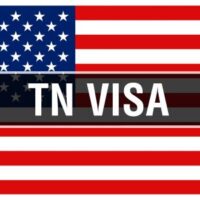TN Visa Changes in 2025: What Professionals and Employers Must Know Under USCIS’ New Guidance

The TN visa, created under the North American Free Trade Agreement (NAFTA) and preserved through the United States-Mexico-Canada Agreement (USMCA), has long provided Canadian and Mexican professionals with a streamlined path to work in the United States. For decades, this visa category has supported industries ranging from engineering and scientific research to healthcare and business consulting. In June 2025, however, the U.S. Citizenship and Immigration Services (USCIS) issued new guidance that significantly alters the way TN visa applications will be reviewed.
These changes carry major implications for both foreign professionals and U.S. employers, especially in states like Texas, where industries such as energy, healthcare, and technology rely heavily on cross-border talent.
The Foundation of the TN Visa
The TN visa was designed to allow Canadian and Mexican citizens to work temporarily in the U.S. in specific occupations listed in the USMCA. Unlike other employment-based visas, the TN visa does not require an annual cap, making it more accessible and attractive to both workers and employers. Eligible professions include accountants, engineers, scientists, medical professionals, and various technical specialists. For decades, applicants could sometimes substitute professional experience for a degree requirement, or rely on broad interpretations of occupational categories. That flexibility is now narrowing.
Key Updates in USCIS’ 2025 Guidance
USCIS’ new guidance introduces several important modifications that every applicant and employer must understand:
1. Stricter Employer Sponsorship Rules
Perhaps the most impactful change is that only U.S.-based entities can now sponsor TN visa applicants. In the past, some foreign-based companies with U.S. operations were able to bring workers under the TN category. Under the new rules, sponsorship must come directly from a U.S. entity. This means professionals working for Canadian or Mexican companies that operate in the U.S. will likely need to restructure their employment agreements or contracts to meet the updated requirements.
2. Narrower Definition of Occupations
USCIS has also narrowed the interpretation of some occupational categories, including roles such as Scientific Technicians/Technologists and Computer Systems Analysts. These categories were previously used more broadly, sometimes covering positions that only loosely fit the statutory descriptions. The agency has now emphasized a closer match between job duties and the definitions in the USMCA list, reducing flexibility for applicants and employers.
3. Elimination of Experience Substitution
Previously, some TN occupations allowed applicants to substitute years of professional experience in place of a bachelor’s degree. That practice is no longer permitted under the updated guidance. Applicants must hold the required educational credentials, leaving fewer options for experienced professionals without formal degrees to qualify.
4. Emphasis on Job Duty Alignment
The updated rules stress that the applicant’s actual job duties, not just the job title, must clearly align with the occupational list. USCIS has warned that inconsistent job descriptions or broad role responsibilities will be grounds for denial. Employers will need to carefully draft offer letters and employment descriptions to ensure compliance.
Implications for Professionals
For Canadian and Mexican professionals, the changes mean that eligibility will hinge more strictly on meeting the letter of the law. Those without a bachelor’s degree in the required field will no longer be able to qualify based on experience alone. Professionals in technology, science, and consulting will need to pay special attention to how their roles are framed, since these are the categories most impacted by narrower definitions. The result may be an increase in denials, particularly for applicants in hybrid or emerging roles not explicitly contemplated when the TN visa list was created.
Implications for Employers
For U.S. companies, the 2025 guidance adds new compliance challenges. Employers must ensure that their sponsorship comes from a U.S. entity, not a foreign affiliate, and that job descriptions match tightly with USMCA-listed occupations. The burden of preparing clear, well-supported documentation has increased, making legal guidance more critical than ever. Companies in energy, healthcare, and technology hubs like Houston may find their recruitment pipelines disrupted if they do not adapt quickly to the new requirements.
USCIS’ Digitization and Oversight Efforts
The TN visa changes fit within a broader trend of USCIS tightening oversight and modernizing processes. As the agency digitizes more of its systems and introduces new tools for reviewing applications, professionals and employers can expect greater scrutiny. This is consistent with USCIS’ focus on reducing fraud and ensuring that temporary work visas are used as intended. While these efforts may create obstacles for applicants, they also offer a more standardized process, which, over time, could improve transparency and consistency.
Preparing for the Future
Both professionals and employers must treat the 2025 changes as a signal that TN visa compliance will be closely monitored. Employers should review all active TN sponsorships to ensure they comply with the updated guidance, and professionals should explore alternative visa categories if they no longer qualify under the new rules. Options may include the H-1B visa for specialty occupations, the O-1 visa for individuals with extraordinary ability, or employment-based green card pathways for those seeking permanent residence.
Contact BBA Immigration
If you are a Canadian or Mexican professional, or a U.S. employer relying on cross-border talent, the 2025 TN visa changes may significantly impact your immigration strategy. Adapting to these stricter requirements requires careful planning and a thorough understanding of the law.
At BBA Immigration, our team is here to help you navigate these changes. Speak with an experienced Houston TN NAFTA Visa Lawyer today to protect your professional future and ensure compliance with the latest USCIS guidance.
Sources:
uscis.gov/policy-manual
travel.state.gov/content/travel/en/us-visas/employment/visas-canadian-mexican-nafta-professionals.html
